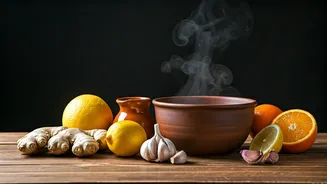Garlic's Antiviral Power
Garlic, a culinary staple, also boasts potent antiviral properties. Its active compound, allicin, has been shown to combat various viruses, including those
responsible for the flu. To harness its benefits, consume fresh garlic. Mince or crush a clove and add it to your meals. If the taste is too strong, consider taking garlic supplements. Additionally, preparing garlic-infused honey can be soothing for coughs and sore throats. This involves infusing honey with crushed garlic, allowing it to sit for several hours or overnight, and then consuming a spoonful as needed. Regularly incorporating garlic into your diet is a proactive measure against the flu.
Honey's Soothing Touch
Honey, a natural sweetener, also serves as an effective cough suppressant and sore throat soother. Its viscous nature coats the throat, providing immediate relief from irritation. Moreover, honey possesses antibacterial and antiviral properties, contributing to overall health. For coughs, consume a spoonful of honey, either straight or mixed with warm water and lemon juice. Be cautious when administering honey to children under one year of age due to the risk of botulism. For adults and older children, honey offers a simple yet effective remedy for flu-related symptoms, promoting comfort and aiding recovery.
Ginger's Anti-inflammatory
Ginger is celebrated for its anti-inflammatory and pain-relieving qualities. It helps alleviate flu symptoms such as fever, aches, and nausea. Ginger's active compounds, gingerols, have demonstrated the capacity to reduce inflammation and combat viral infections. Brew ginger tea by simmering fresh ginger slices in hot water for about 10-20 minutes. Add honey and lemon for enhanced flavor and benefits. You can also incorporate ginger into your meals by grating it into stir-fries, soups, or stews. Ginger is an accessible and potent remedy that can significantly reduce discomfort and facilitate recovery during a bout of the flu.
Lemon's Vitamin C Boost
Lemons, abundant in vitamin C, offer a significant boost to the immune system. Vitamin C is a well-known antioxidant that supports the body's defense mechanisms, helping to fight off infections. The consumption of lemon helps in reducing the duration and severity of flu symptoms. Prepare lemon tea by squeezing fresh lemon juice into hot water. Add honey to sweeten and enhance its soothing properties. Alternatively, consume lemonade or add lemon slices to your meals. Incorporating lemons into your diet, particularly during flu season, is an easy way to fortify your body's defenses and combat illness.
Echinacea's Immune Support
Echinacea is an herb widely recognized for its immune-boosting capabilities. It is believed to stimulate the immune system, thereby making it more adept at fighting off infections, including the flu. Echinacea can be taken in various forms, such as tea, capsules, or tinctures. For tea, steep echinacea root or leaves in hot water. Follow the product's instructions for capsule or tincture dosages. Echinacea is most effective when taken at the first sign of flu symptoms. Regular use may also help to decrease the duration and intensity of the illness. Prior to using Echinacea, consult a healthcare provider.
Steam's Congestion Relief
Steam inhalation is a natural method to alleviate nasal congestion and ease breathing difficulties associated with the flu. The moist heat helps to loosen mucus, providing relief from stuffiness. To use steam inhalation, fill a bowl with hot water, add a few drops of essential oils like eucalyptus or tea tree (optional), and lean over the bowl with a towel draped over your head to trap the steam. Inhale deeply for 5-10 minutes. Alternatively, you can take a hot shower or sit in a steamy bathroom. Steam inhalation provides immediate relief and reduces discomfort, facilitating easier breathing during illness.
Turmeric's Anti-inflammatory
Turmeric, with its active component curcumin, is renowned for its potent anti-inflammatory properties. Curcumin helps in reducing inflammation throughout the body, providing relief from flu symptoms such as aches and pains. It also possesses antioxidant qualities. To harness turmeric's benefits, add it to your diet by incorporating it into your cooking, mixing it with milk to make golden milk, or taking turmeric supplements. Consider combining turmeric with black pepper to enhance the absorption of curcumin. Daily consumption of turmeric, especially during flu season, is a proactive measure for reducing inflammation and bolstering the body's defenses.
Elderberry's Antiviral Action
Elderberries are often used for their antiviral properties. They have been shown to potentially reduce the length and severity of flu symptoms. Elderberry contains compounds that inhibit the virus's ability to replicate, promoting quicker recovery. Elderberry is available in the form of syrups, lozenges, and teas. When you experience flu symptoms, follow the dosage instructions on the product label. It is often most effective when consumed at the initial signs of illness. Elderberry can be a valuable addition to your flu-fighting arsenal due to its potential to reduce the duration and impact of the flu.
Rest and Hydration
Rest and hydration are fundamental elements in the recovery process when battling the flu. The body necessitates rest to conserve energy and focus its resources on healing. Adequate hydration helps in maintaining bodily functions, facilitating the elimination of toxins, and easing symptoms such as fever and congestion. Aim for at least 8 glasses of water a day, including clear broths, herbal teas, and electrolyte-rich beverages. Prioritize sleep and reduce your activities. Rest and hydration are crucial for a faster and more effective recovery from the flu. It also helps to prevent complications.
Chicken Soup's Comfort
Chicken soup is a time-tested remedy for the flu. It provides both comfort and potential health benefits. Chicken soup is rich in nutrients and electrolytes, promoting hydration. The warmth of the soup helps soothe sore throats and eases congestion. Furthermore, chicken soup contains anti-inflammatory properties. You can prepare homemade chicken soup or opt for store-bought varieties, ensuring it's low in sodium. Consuming chicken soup is a comforting and nutritious way to alleviate symptoms and aid recovery. It is a simple, effective, and readily accessible remedy during the flu season.














